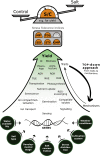Salt stress under the scalpel - dissecting the genetics of salt tolerance
- PMID: 30548719
- PMCID: PMC6850516
- DOI: 10.1111/tpj.14189
Salt stress under the scalpel - dissecting the genetics of salt tolerance
Abstract
Salt stress limits the productivity of crops grown under saline conditions, leading to substantial losses of yield in saline soils and under brackish and saline irrigation. Salt tolerant crops could alleviate these losses while both increasing irrigation opportunities and reducing agricultural demands on dwindling freshwater resources. However, despite significant efforts, progress towards this goal has been limited, largely because of the genetic complexity of salt tolerance for agronomically important yield-related traits. Consequently, the focus is shifting to the study of traits that contribute to overall tolerance, thus breaking down salt tolerance into components that are more genetically tractable. Greater consideration of the plasticity of salt tolerance mechanisms throughout development and across environmental conditions furthers this dissection. The demand for more sophisticated and comprehensive methodologies is being met by parallel advances in high-throughput phenotyping and sequencing technologies that are enabling the multivariate characterisation of vast germplasm resources. Alongside steady improvements in statistical genetics models, forward genetics approaches for elucidating salt tolerance mechanisms are gaining momentum. Subsequent quantitative trait locus and gene validation has also become more accessible, most recently through advanced techniques in molecular biology and genomic analysis, facilitating the translation of findings to the field. Besides fuelling the improvement of established crop species, this progress also facilitates the domestication of naturally salt tolerant orphan crops. Taken together, these advances herald a promising era of discovery for research into the genetics of salt tolerance in plants.
© 2018 The Authors.The Plant Journal published by Society for Experimental Biology and John Wiley & Sons Ltd.
Conflict of interest statement
All authors declare that there are no conflicts of interest.
Figures


References
-
- Abbo, S. , Pinhasi Van‐Oss, R. , Gopher, A. , Saranga, Y. , Ofner, I. and Peleg, Z. (2014) Plant domestication versus crop evolution: a conceptual framework for cereals and grain legumes. Trends Plant Sci. 19, 351–360. - PubMed
-
- Aflitos, S. , Schijlen, E. , De Jong, H. et al (2014) Exploring genetic variation in the tomato (Solanum section Lycopersicon) clade by whole‐genome sequencing. Plant J. 80, 136–148. - PubMed
-
- Alexandratos, N. and Bruinsma, J. (2012) World agriculture towards 2030/2050: the 2012 revision. ESA Working paper No. 12‐03. Rome: FAO.
Publication types
MeSH terms
LinkOut - more resources
Full Text Sources
Other Literature Sources
Miscellaneous

